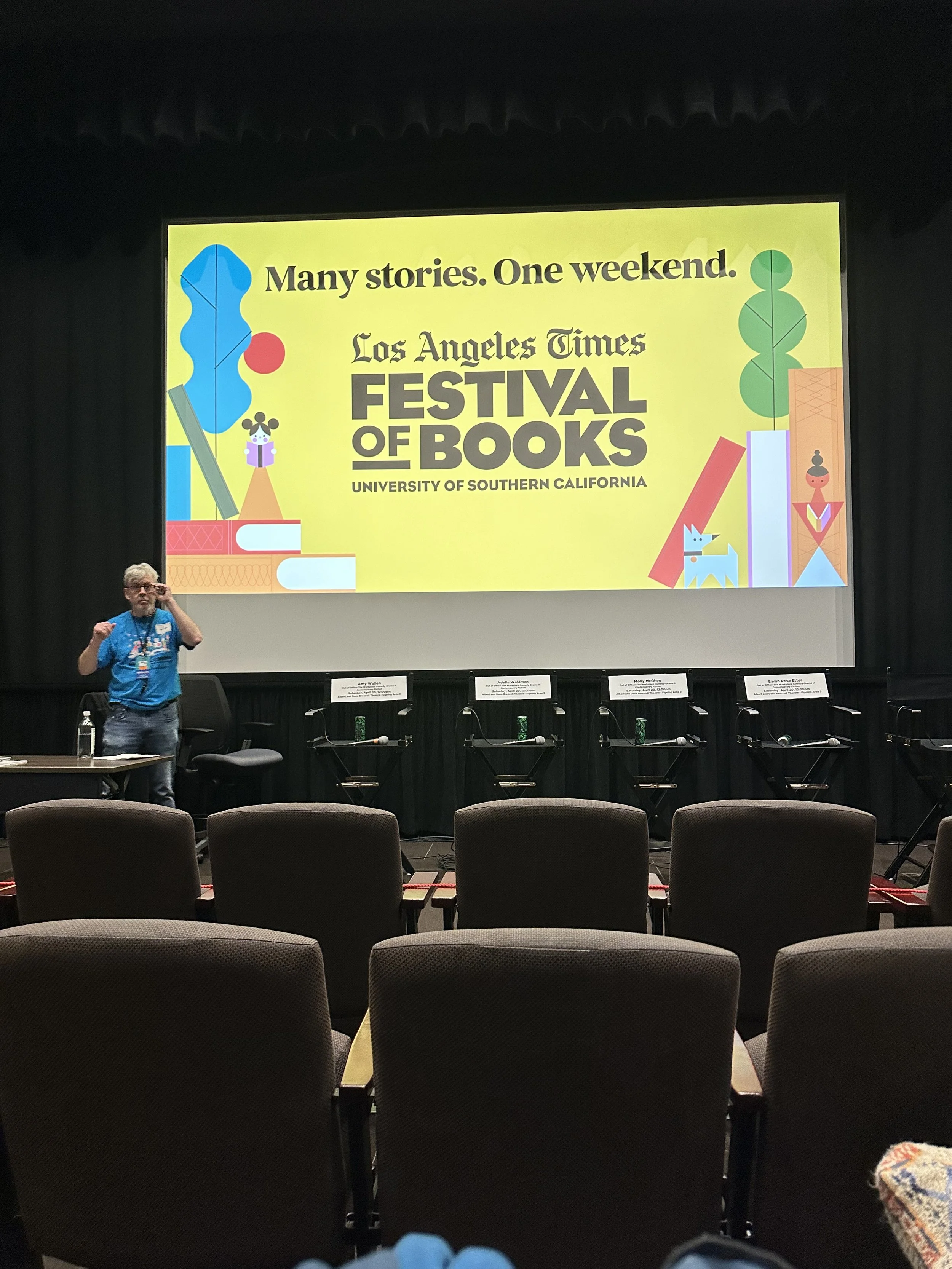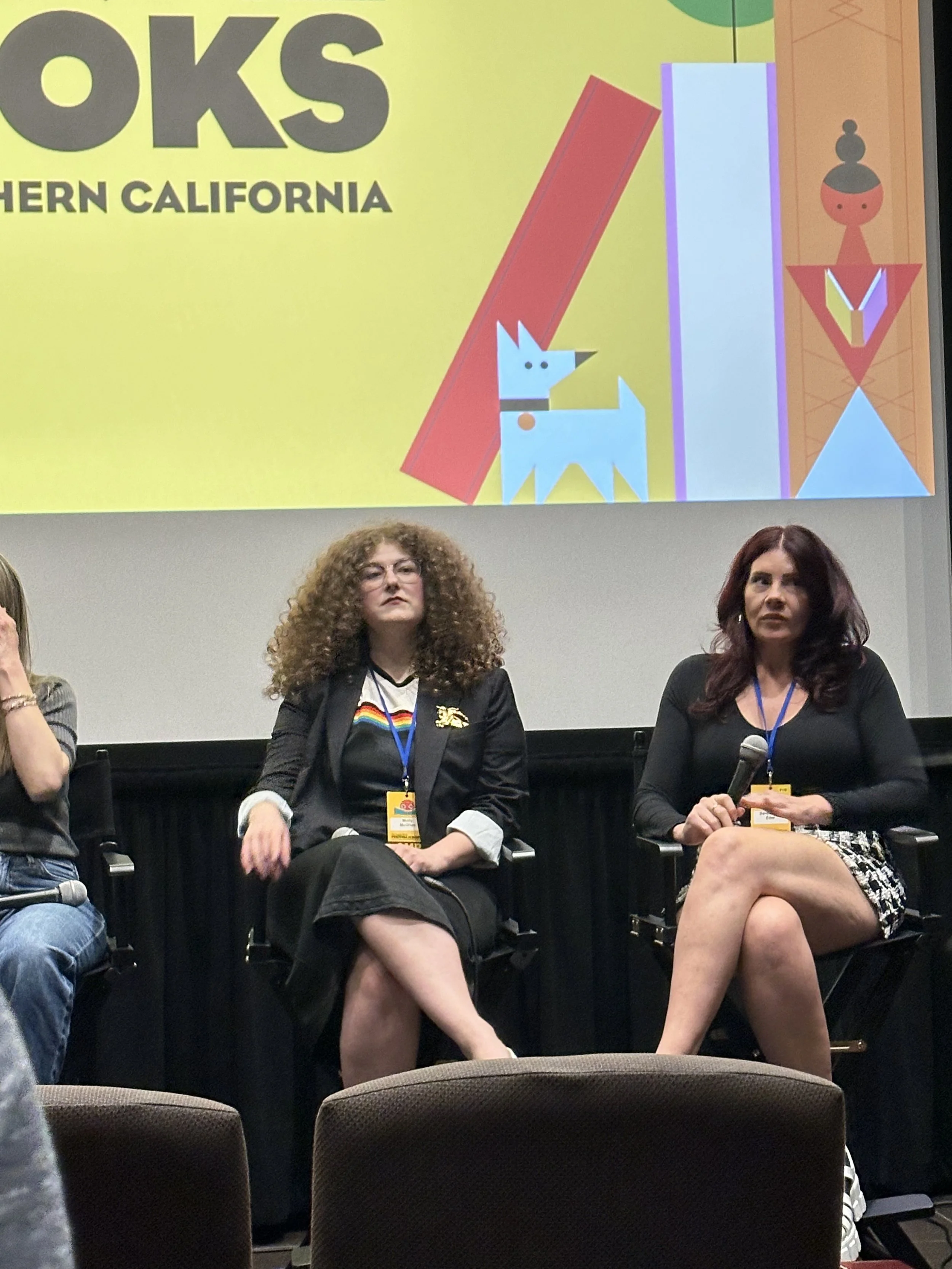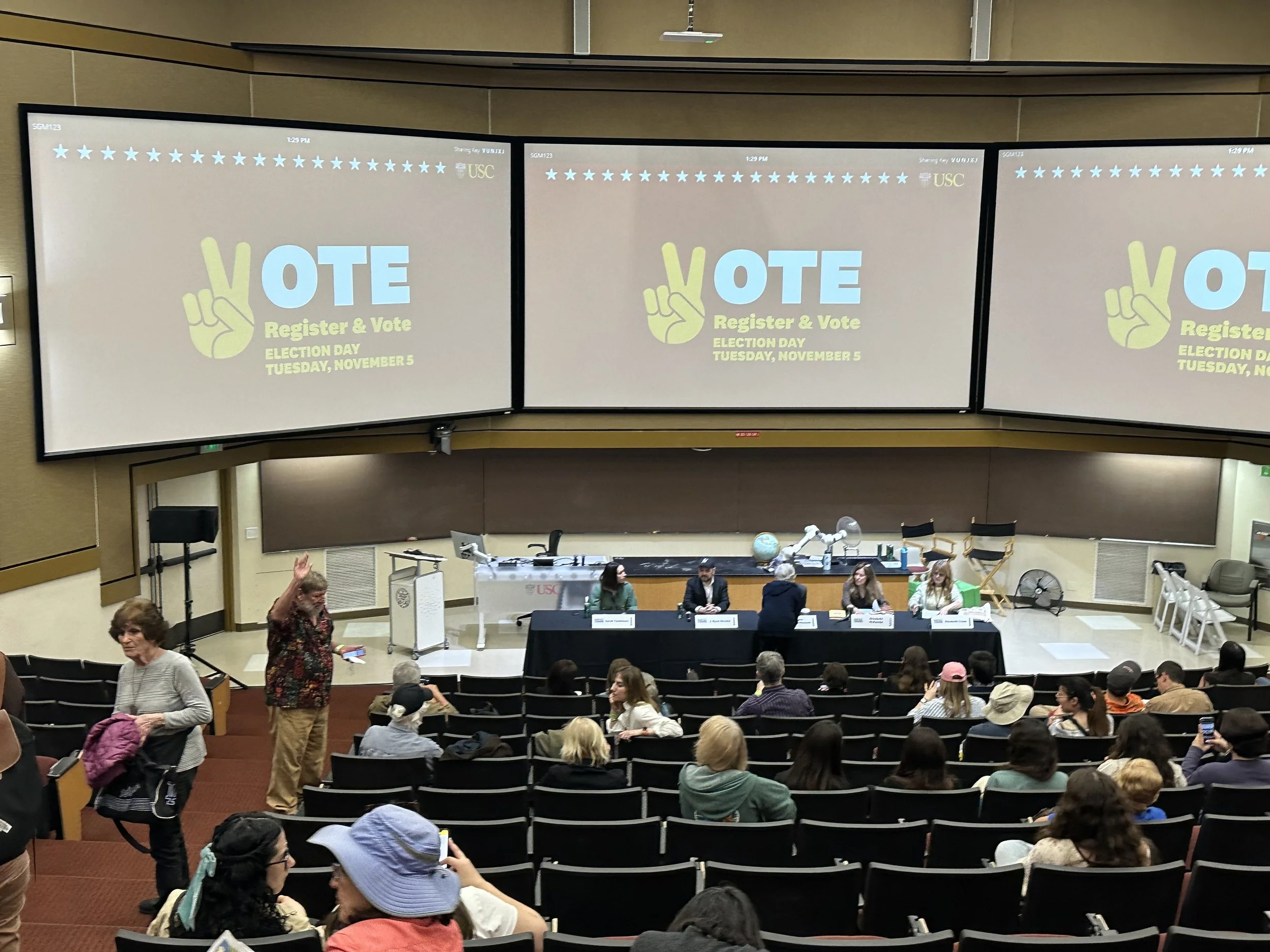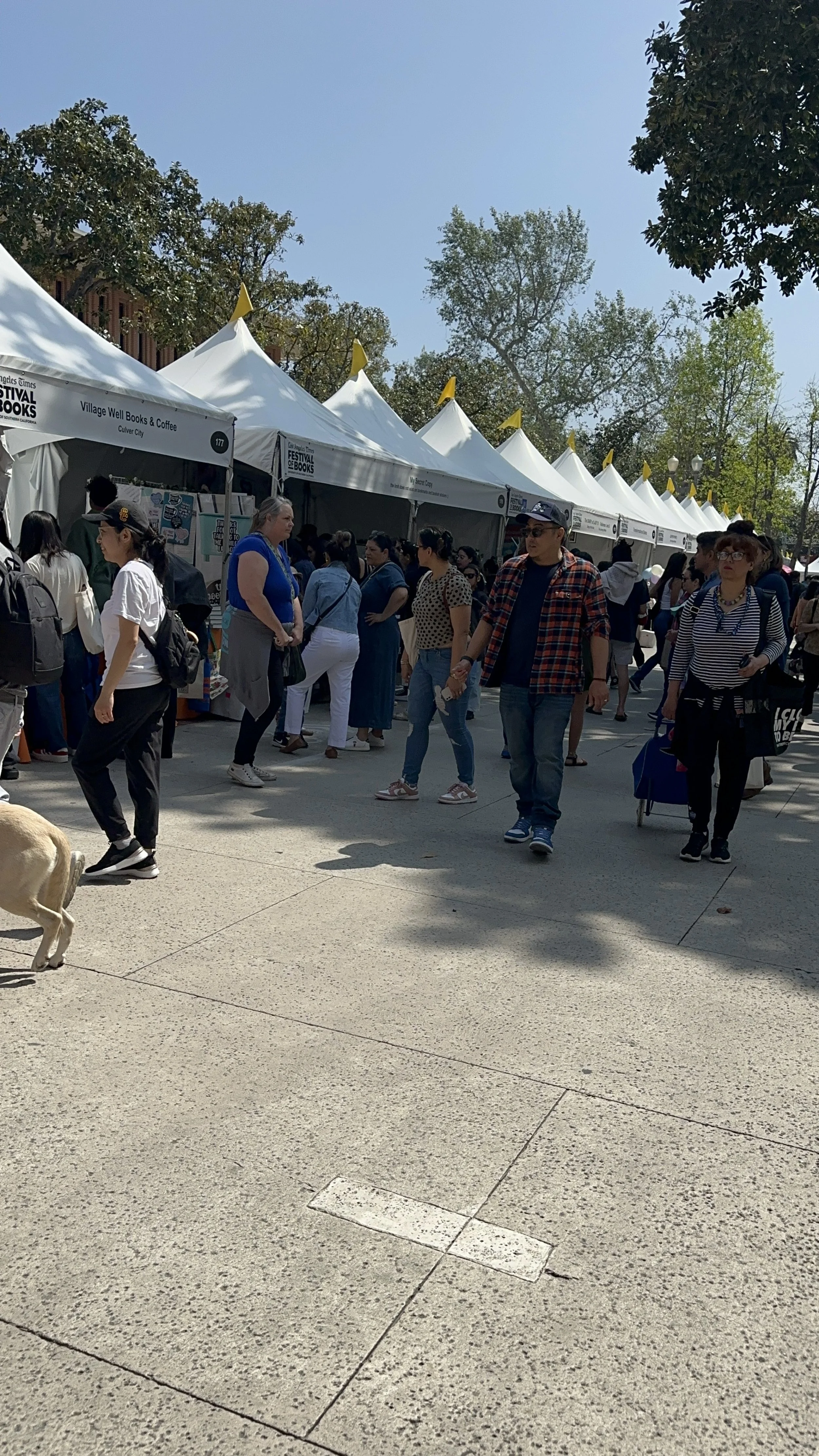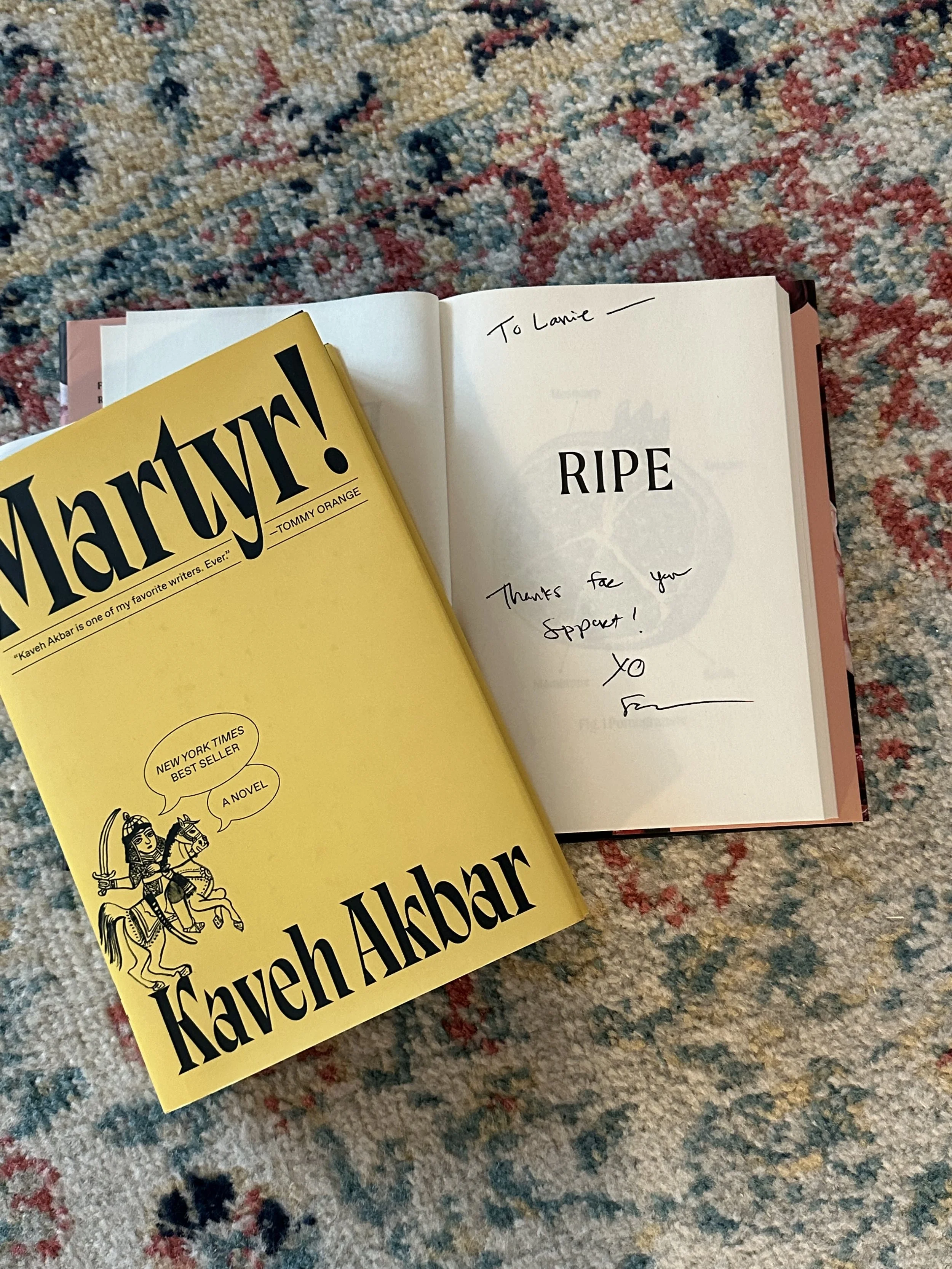Looking Back at the LA Times Festival of Books 2024 (+ Summer Reading Recs)
by Lanie Brice ‘24
The LA Times Festival of Books is impossible to miss if you visit USC’s campus in the second to last week of April. Every year, campus is overtaken by stages and white tents in the week leading up to the weekend-long book fest that spans genres, age groups, and the entire campus. After three years of watching the assembly of the event, and being a lifelong major book lover, I decided to check off another senior year bucket list item and visit.
There’s a number of ways you can enjoy the book festival. There are panels, which are ticked for $6 a piece, endless booths to explore, and various free to access stages hosting everything from music to dance to author talks. Then there are the food trucks and screenings of bookish movie adaptations for those that aren’t the biggest readers. Since this festival offers something for everyone, it’s no surprise that campus was packed. I struggled to make my way through the crowds on Saturday, and that trickled into the E line being the busiest I’ve ever seen it.
While I’d hoped to get to visit both days of the festival, in true senior fashion, I didn’t finish getting all my furniture moved out of my apartment in time to attend Day 2. Unfortunately, senior year leaves many of us with too many responsibilities to completely toss everything aside to have fun. Nevertheless, here’s a full recap of my festival experience, the new adaptations screened at the festival, and the authors I recommend you add to your summer reading list.
Panels
I attended two panels on Saturday. The first, located in a cozy theater in the cinema building, focused on novels set in the workplace, two that have a bit of a surrealist bend to discussing the bleak realities of American office culture. Moderated by Amy Wallen, the panel featured Adelle Waldman (author of Help Wanted), Molly McGhee (author of Jonathan Abernathy, You Are Kind), and Sarah Rose Etter (author of Ripe).
I chose to start my festival visit off with this panel because I’m a huge fan of Etter’s book, Ripe. I was hoping to get some insight into how she crafted such a compulsively readable book, something I would like to emulate as a fiction writer myself. Much of this panel, however, focused on the writer’s personal work experiences more than their books. Etter shared that her first job was being the “fry girl” at McDonalds as a young teen and that she got fired for giving a hot guy three free Big Macs.
Wallen then added that, though not her first job, she did get held up while working at Starbucks, and while it was clear she wasn’t in much danger because the guy didn’t seem to have a gun, she was still traumatized that her manager didn’t even let her have a break to complete the police report.
McGhee had an equally interesting story from growing up on a farm and becoming a farmhand at age 12. She ended up covered in cicadas one day, which, though not dangerous, was deeply unsettling. Before her dad and a co-worker plucked them all off, they looked at each bug’s eyes because there was a Vanderbilt study at the time paying good money for cicadas with a certain eye color.
The second panel I attended was entitled Women (And Men) on the Edge hosted in an auditorium in SGM complete with massive periodic tables on the walls. Moderated by Elizabeth Crane, this was a larger panel featuring Sarah Tomlinson (author of The Last Days of the Midnight Ramblers), A. Ryan Stradal (author of Saturday Night at the Lakeside Supper Club), Marie Mutski Mockett (author of The Tree Doctor), and Elizabeth McKenzie (author of The Dog of the North). This panel was much more craft focused.
At one point, Crane posed a question about how much of themselves each author puts into their novels. Tomlinson, who had essentially written autofiction about her time as a ghostwriter, mentioned that she was surprised that her subconscious had not only modeled the main character off herself but one of the important side characters was also imbued with many of her own feelings and experiences, even though she didn’t set out to do this. Stradal pointed out that he appreciated being asked the question because it’s typically only posed to women writers when his books are, in fact, very personal. McKenzie illustrated how she took parts of her own life, like her parents actually emigrating to Australia like her main character’s parents do, and then distilling her feelings about the situation into metaphors and useful storytelling devices to build the plots for her work that then significantly stray from her lived experience.
I also got the chance to ask this amazing panel of writers a question. I asked how they know that a novel idea is formed enough that they’ll be able to see it through to a full draft. Stradal is ready to start when he knows the ending and a situation that would make that ending nearly impossible. Tomlinson advised waiting until you feel your character has a “heartbeat,” meaning that you could put them in any situation and know how they would respond. Mockett simply starts when it hits her that, “Oh shit, it’s a novel!” Whereas McKenzie is more cerebral in her approach: “I look for something I’m upset about,” as a starting point and then works to look at this seed from different angles until it opens up.
Stages
The stages (Children’s Stage, Cooking Stage, L.A. Times Main Stage, Latinidad Stage, Poetry Stage, USC Stage, and YA Stage) offered fun, free entertainment to the masses of festival goers. Adrian, a fellow T360 blogger, spent some time sitting at the Poetry Stage taking in the various acts. YouTubers Rhett & Link presented a cooking demo to promote their new cookbook. Ariana Maddix from the Bravo TV show Vanderpump Rules presented her cocktail book on the Main Stage. And tons of USC students, many of them my classmates, took to the stage to play music including the band MyBetsy.
Booths
There are so many exhibitors at the festival. It can be overwhelming to navigate the narrow tents wedged up and down Trousdale, through Doheney’s lawns, and all over Founder’s Park. These booths ranged from author coaching and MFA programs to writers associations to bookish goodie companies to literary magazines. Of course, there were also outposts from all of Trojans360 staff’s favorite LA bookstores offering the poems, novels, and nonfiction tomes from authors at the festival and beyond. I loved how each of these bookshop tents managed to capture the unique, particular essences of the stores I knew from visiting their shops over the years. Since I’m leaving LA very soon, this felt like a nice way to revisit some of my favorite places. Despite it being incredibly busy, I enjoyed browsing through BookSoup’s highly curated tent, and I made my only book purchase at the festival from Skylight.
Screenings
If you’re more of a screen person, the LATFOB has you covered too. Saturday’s crown jewel event was a free, advanced screening of YA legend John Green’s latest movie adaptation and his first following The Fault in Our Stars. With actors, directors, and Green himself, the screening was followed by a panel discussion. The Turtles All The Way Down movie will be available to stream on HBO Max May 2. Then, Sunday started with the 10 a.m. world premiere of the Hulu adaption of the highly acclaimed book Queenie followed by a conversation.
3 of My Favorite Recent Books From Festival Authors
Ripe by Sarah Rose Etter
For those of us who aren’t feeling particularly optimistic about our futures in corporate America, Cassie’s story of working in Silicon Valley won’t be uplifting, but it is cathartic and, at times, hilarious. I read this book in just about a day over winter break and felt incredibly seen. Do be warned, though, this book gets pretty dark.
Here’s my summary from my review on my book blog Reading, Writing, and Me: Cassie moved to San Fransisco for a tech job that was supposed to signify finally making it in the corporate world. She's left behind a contentious relationship with her mother and her emotional anchor in the form of her father on the East Coast. The job, San Fransisco, and her relationship with a chef who already has a girlfriend slowly drains her will to continue. Set vaguely around the dawn of COVID with a virus and terrible wildfires engulfing California, Cassie struggles to keep her head above water.
Death Valley by Melissa Broder
Broder writes amazing, wacky, surreal novels set in and around LA. Death Valley is both her best and most recent novel focused on a writer who goes to a Best Western in the desert outside of LA to focus on her novel and escape her grief over her dying father. She ends up hallucinating in a cactus.
Here’s my summary from my review on my book blog Reading, Writing, and Me: The narrator decides to take a trip to the desert to leave behind her problems in Los Angeles and maybe find some inspiration to write her next novel at a pleasingly bland Best Western off the highway. Instead, she finds a hiking trail and a magical cactus that gives her a portal through which to explore her grief about her father's time in the ICU and her struggle with her husband's worsening chronic illness. The desert offers both catharsis and peril as she spends a few days confronting life, death, and nature and reframing her perspective on life.
Martyr! By Kaveh Akbar
Disaffected and a bit over life a few years out of college, Cyrus becomes obsessed with learning how to make his death matter. To do that, he starts writing about various martyrs, leading him to connect with an artist choosing to live her final days in the Brooklyn Museum as she dies of a terminal illness. A beautifully complex novel, it’s obvious that Akbar was already an acclaimed poet when he sat down to write a novel.
Here’s my summary from my review on my book blog Reading, Writing, and Me: Cyrus isn't attached to being alive, but he also desperately needs his death to matter. The obvious track to get there is through his writing. His poetry career hasn't gone much of anywhere since he graduated college. He honestly hasn't done much writing in the interim. He's been focused on addiction recovery and making it from one day to the next. His life has stalled, and his new recipe for making a name before his death is to write a book about martyrs whose death meant something. That sends him to New York City to meet an artist who's making her death matter. Turns out their lives are much more intertwined than it would appear.
Want more from Trojans 360?
Visit Trojans 360 on Facebook & Twitter to stay up to date with more student content! You can also Ask A Trojan an anonymous question, and we’ll try to answer it in a future post. And don’t forget to follow us on Instagram!
Trojans 360 is USC’s official student-run blog. Content created by students, for students.

